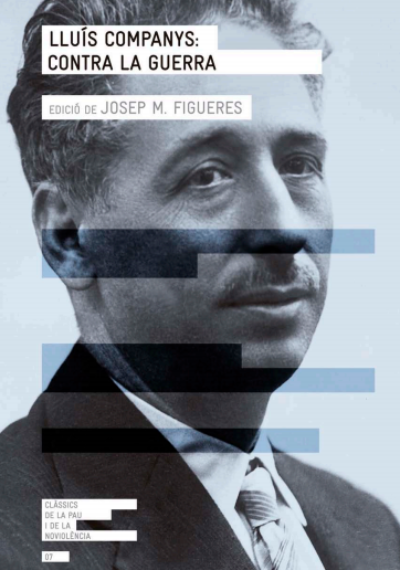
Josep M. Figueres (ed.). Lluís Companys: contra la guerra. Barcelona: Institut Català Internacional per la Pau; Angle, 2013. Col·lecció Clàssics de la pau i de la noviolència, 7.
Between 1921 and 1923, Lluís Companys fought incessantly against the Spanish presence and military intervention in Morocco: as a member of Parliament, his was one of the most critical voices; as a Catalan politician, he organized many rallies; and as a journalist, he wrote numerous articles in newspapers and magazines.
A great expert on Companys, Josep M. Figueras has selected and edited his writings and speeches in Parliament against this war in this volume. Companys holds General Berenguer and the King responsible for the war and demands an immediate withdrawal from Morocco.
The antimilitarist activism of Companys was part of the ideology of Republicanism and left-wing Catalan nationalism, and connected with the discontent of the working class. As Antoni Segura states in the prologue, antimilitarism was “a tool in the struggle against an establishment –monarchy, landowners, financiers, armed forces– that was decrepit and willing to sacrifice young lives at the altar of imperial vanities. In this respect, it was an antimilitarism with modern characteristics that connects perfectly well with the more recent antiwar protest movements.”
A compilation of texts that reveals the courageous and critical voice of Lluís Companys against an absurd, unpopular and disastrous war.
Josep Maria Figueres
A historian and Professor of History of Journalism at the Autonomous University of Barcelona, he has specialized in the study of political Catalan nationalism. He has focused on court-martials and, especially, on the Catalan press, on which he has done extensive research and published a number of research papers, manuals, etc. Among the most important are La Renaixensa (1981), Diari Català (1999), Premsa i nacionalisme (2002), Veus de l’exili (2005) and Entrevista a la guerra (2007). His latest publications include the complete works of Valentí Almirall (2009-2012), Les cròniques de Guerra de Lluís Capdevila (2011), El periodismo catalán. Prensa e identidad (2012) and La Veu de Catalunya (2013).
Lluís Companys
Political leader who in the 1920s organized the agrarian left with the creation of the Unió de Rabassaires trade union. Member of Parliament for the Republican Left, replacing Francesc Layret, who had been assassinated. He gained notoriety and, in 1933, after serving as prefect of Barcelona, member of the Spanish Parliament, minister of the Navy, and member and president of the Catalan Parliament, he became president of the Generalitat, following the death of F. Macià. He was president during the length of the Civil War, was exiled, arrested in France, brought back to Spain, and executed in 1940 after a controversial court-martial. He became a charismatic figure and a symbol in the fight for national and democratic freedoms.
